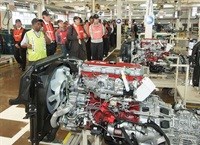
Top stories





Energy & MiningGlencore's Astron Energy gears up with new tanker amidst Sars dispute
Wendell Roelf 15 hours

More news

















Logistics & Transport
Uganda plans new rail link to Tanzania for mineral export boost











The official opening of the relocated assembly plant was attended by a number of dignitaries, including the chairman of the board of Hino Motors, Masakazu Ichikawa.
Dr van Zyl went on to say that this latest investment in the truck plant is only part of recent investment in local production, with more than R1 billion having been spent on production facilities in Prospecton over the past couple of years. He went on to add that Hino is a strong brand with great global success and in South Africa the truck segment of the market is seen as a good growth opportunity, both in the domestic and export markets.
"As a group company, Toyota is committed to the Hino brand and this investment underlines just how serious we are about trucking - as per the Hino brand campaign launched in 2013 and we will Keep on Trucking," explained Dr van Zyl.
"This, of course, links in to Hino Total Support. Our Hino colleagues - both in production and in marketing - realise the critical importance of total and constant support to our customers. A truck experiencing downtime can result in huge losses to our customers and as part of our brand promise of total commitment we have also made substantial investments in technician training and parts supply to ensure dedicated dealer support for customers."
The new assembly plant currently has an annual production capacity of 5000 units on a single shift and this can be increased significantly as demand grows. The number of people employed at this plant and its related support functions currently stands at over 160 team members.
The move to the new facility took place during shutdown at the end of last year and enabled them to implement a new assembly principle called the Jundate Principle. This allows for subcomponents to be assembled away from the main assembly line. Once these parts are assembled they are delivered in sequence to the line JIT (just in time) to be fitted to the unit on line with benefits in terms of both productivity and quality.
At present the trucks produced there - all the Hino models as well as Toyota Dyna - are for the domestic market and neighbouring countries only. Hino trucks for other markets in Africa are imported from Japan, with many passing through South Africa to have bodies and special equipment fitted. A switch to local production for some of these export markets could occur in the future.
The TSAM president and CEO went on to say that that besides the company's investment in the Hino brand he is particularly upbeat in terms of the confidence being shown in the brand by the Hino dealers recently.
"Significant investments have been made, and are currently being made, by them in new and upgraded premises. Almost 50% of our Hino dealer network has invested or is currently investing in new or revamped premises since 2010, with the total investment over the period running to well over a R100 million.
"These investments by our dealers - many of whom have been involved with Hino trucks since they arrived in South Africa in 1972 - correspond with our Hino Total Support philosophy. With our dealers we aim to provide an excellent, high-quality customer experience in both the sales and parts delivery areas of the business - it truly is the only way to Keep on Trucking," said Dr van Zyl.
Globally, Hino recently reported new records in terms of unit sales, sales revenue and profit for the 2013/14 financial year, which ended on 31 March. Unit sales increased by 7.5% to 162, 000, with 68.6% of sales coming from markets outside Japan. The company remained the leader in the Japanese domestic truck market with a dominant market share of around 30%.
South Africa is one of the growth markets for Hino and Hino SA is regularly among the top-10 export destinations.
Domestically, Hino has made a good start to the year in the local market with total sales of 1126 medium, heavy and extra-heavy trucks in the first four months of 2014. This equates to second place in the rankings of local truck manufacturers and distributors and Hino retained its number one position in the medium commercial vehicle segment with Dyna and Hino 300. More than 130,000 Hino and Dyna trucks have been sold in SA to date, giving Hino one of the largest truck parks in the country.
Dr van Zyl went on to say that on the global stage, one of the highlights for the year in the Hino world is the company's participation in the annual Dakar Rally in a joint venture with Team Sugawara and he was pleased to announce that Hino will be back in 2015 with further improved 500 Series trucks.
"Hino is the only Japanese truck maker that competes in this gruelling marathon event and has by far the best reliability record of any participating manufacturer with 23 consecutive finishes since entering for the first time in 1991.This year, both trucks again completed the course and finished 1-2 in the category for trucks with engines of less than 10 litres capacity.
"Next year, the team will not only be looking for a sixth successive win in the under 10-litre category, but will also be aiming for a high position in the overall classification as both racing trucks will use the more powerful 9-litre A09C engine - certainly something to look forward to," concluded Dr van Zyl.